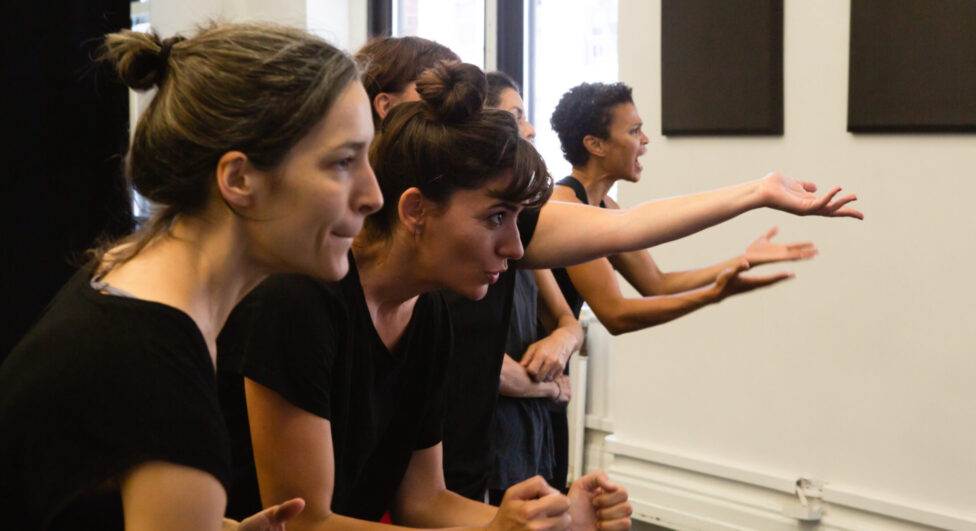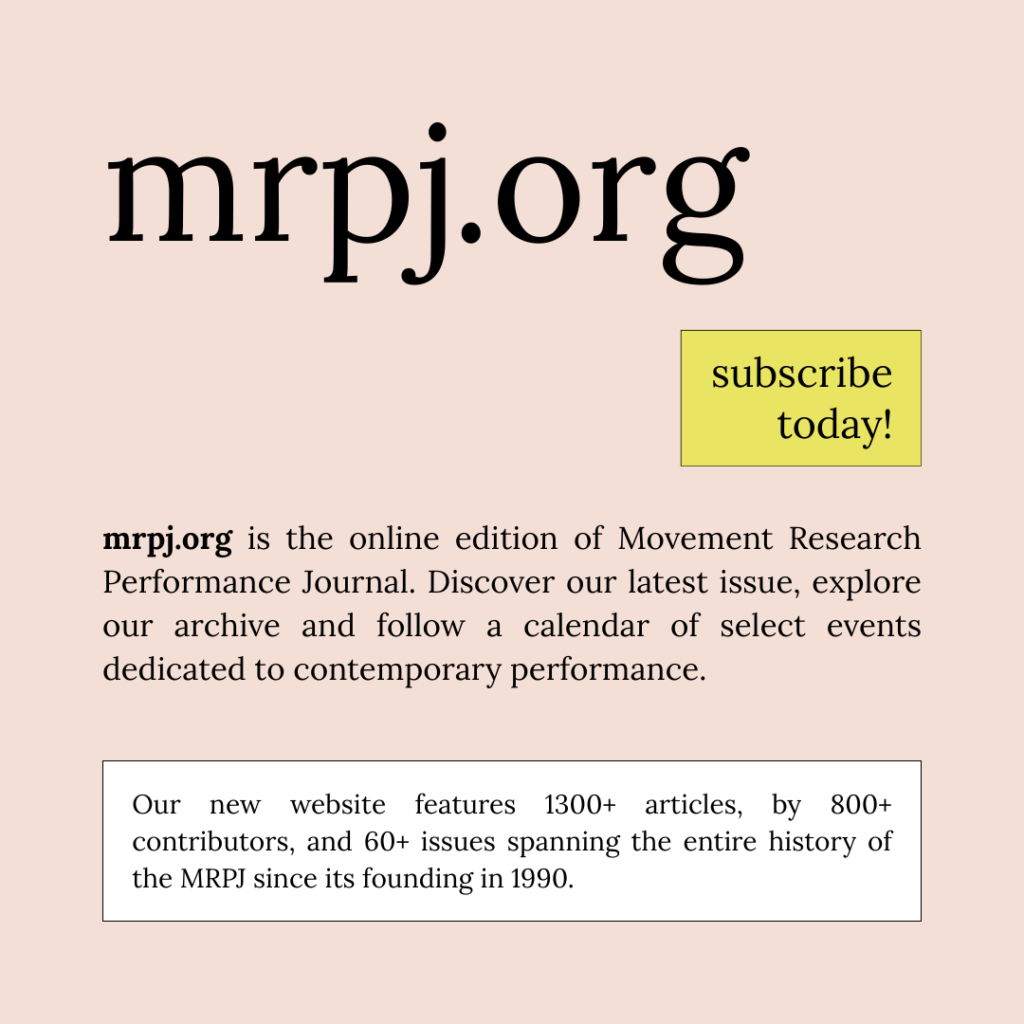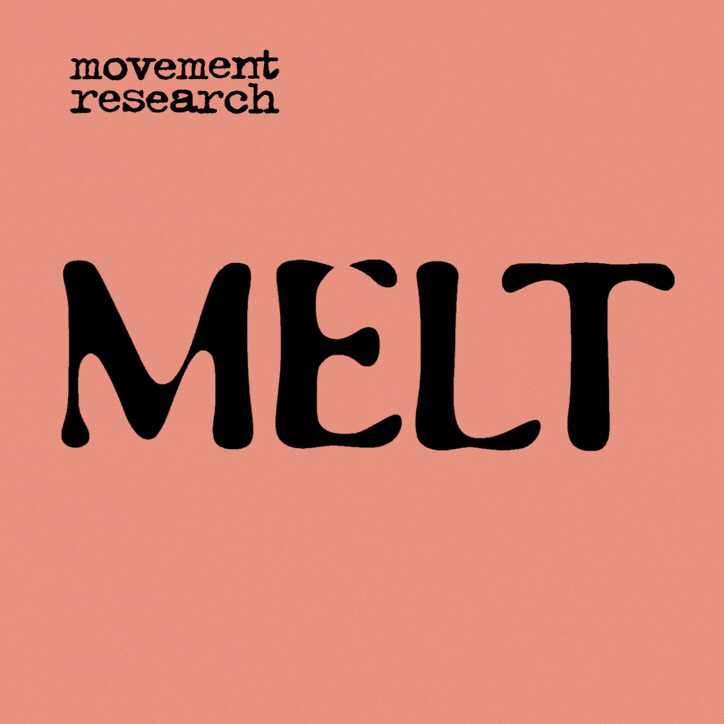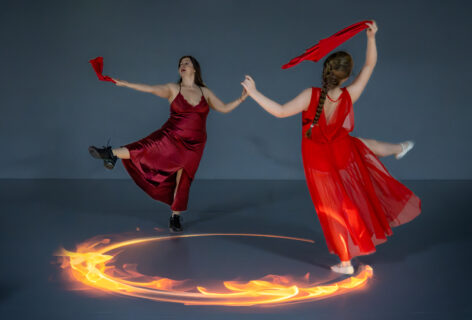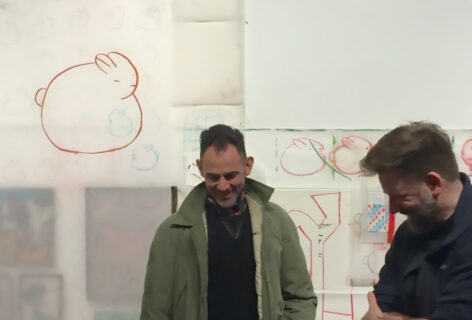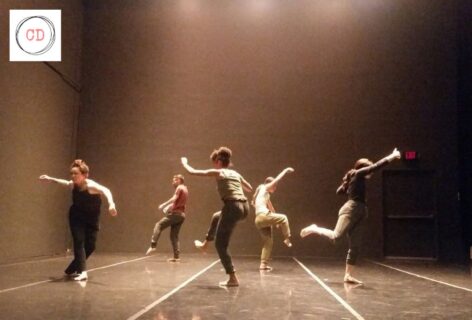In Conversation with Carla Forte, Ermira Goro, Rosalynde LeBlanc, Joanna Leśnierowska, and Ildikó Tóth
The seed of our piece light and desire was women artists during fascist times and how women move through obstacles. We all shared our own experience as a global collective. We made a beautiful work that included 15 women from the NYC dance scene as a sort of art activism/social protest. The work reflects our collective understanding and we focused in on transition and transformation both physically and psychologically. So I guess I need to know now, in this moment, how are you transforming? How are you, in your city, with your circumstances, moving through this obstacle?
Colleen Thomas: I think that.. maybe… I’m doing ok, then I’m not, then I’m doing ok, then I’m not. In my meditation group today they said that even if you meditate for thirty minutes and 29 minutes are shit and one minute is good, focus on that minute. How are you all doing?
Joanna Leśnierowska:I am in Poland and I am really stuck here. Our borders are closed and my partner is stuck in Bonn, Germany. He cannot come to me. I wanted to go to him but just learned that the Germans are only letting in the people who are really indispensable. Until May 3rd at least. I’m really alone here and I miss people touching me, just normal interactions. I hope that after May third I would be able to go to Germany, that the Germans would loosen a bit these regulations for crossing borders. I can leave Poland, on the way back I would be forced into two weeks quarantine under the supervision of the police. Total quarantine.
Ildikó Tóth: All borders are closed, all European borders are closed.
JL: Germany let in the Romanian guest workers to pick up asparagus, so obviously asparagus is more important than my love, at the moment.
CT: So you’re just staying in your apartment, except for when you need food? What are you doing to stay healthy?
JL: We can go out on walks, we just need to wear the obligatory masks. Now I have a space in my apartment to work, and I am learning how to work at home. My apartment was supposed to be a place designed to take rest. Before I was only here in the evenings, this is where I would go to disappear, to be cozy. It is very nice, but it isn’t a working space. I had to install wifi and I feel like I contaminated my space.
I’m still fine, I’m healthy, everything is secure financially, I have a lot of work, so I do it.
CT: It is depressing to think we might be on Zoom for god knows how long. Thinking about doing all classes on Zoom thru the fall, it is really a depressing thing to think about. We don’t see an end! It is nearly impossible to be on the screen that many hours a day, without the give and take with human beings that we are used to and that we thrive off of and that we have spent our lives getting good at.
IT: I would like to be Swedish right now. Did you know that they didn’t lock down anything? They just kept on going. And they’re doing fine so far. They’re estimating that they already have herd immunity acquired. They didn’t do anything. The stores were open, the markets were open, you could go for walks and be outside.
CT: I guess it’s not so crowded there? Because I don’t see a light at the end of the tunnel for our field. We have to be in big groups together. I don’t know how it is going to resolve.
IT: What we all realize is that there’s a lot of work we could be doing in terms of writing applications and developing projects, theoretically. But we cannot be in the studio together. What really matters is the physical contact and being together in space and creating. People are asking us to describe our practices now and, I’m like, UGH. who cares?! I just wanna be in the studio with people, and MOVE!
CT: Dance seems like it is going to be one of the last things to come back to society.
IT: Because we’re not important.
CT: Because we’re not essential.
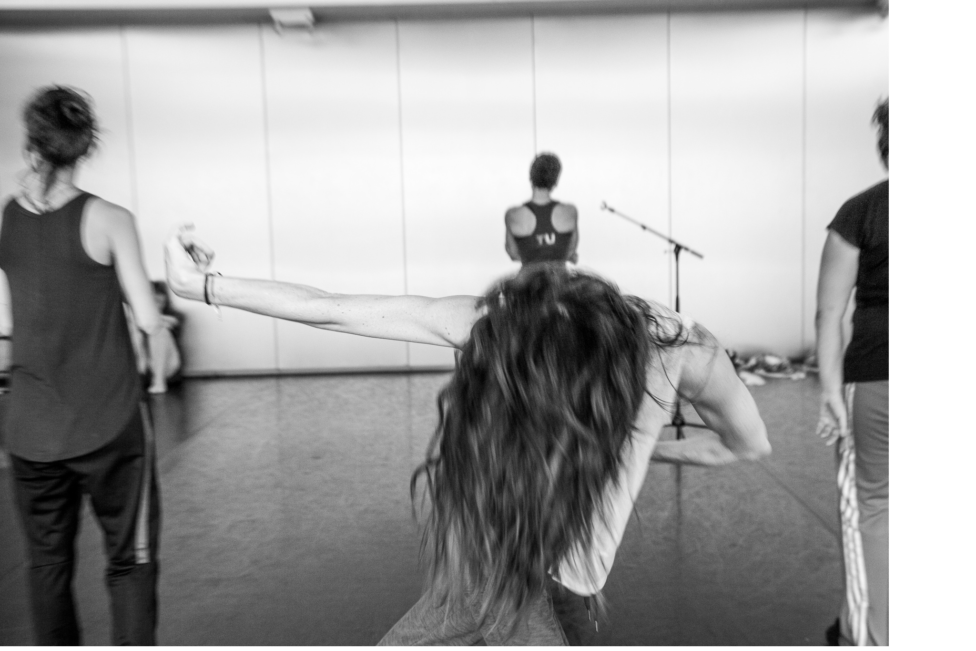
photo by Miguel Anaya
IT: Maybe rehearsals will be possible. But, an audience? More than fifty people in one space? I don’t know when that’s going to happen again.
JL: In Poland, people are talking a lot about not wanting to go to the theater anytime soon, because it is such an obvious threat. Or even that people will be so tired of sitting in isolation that they will choose open air, walking, and other things over going to the dark theater and sitting close to strangers. There are plans to again cut audiences in half, to seat people one meter away from each other, but people may just not want to go at all.
Carla Forte: I had my feature film in an international film festival on March 8, I was in a room with 200 other people and because of that, my family decided to seriously quarantine. My dad has a lung illness, so he is high risk. We are in Miami and we stopped going to supermarkets, everything that we buy is from the internet and we clean everything that comes in the house. We started feeling crazy, scared of getting in contact with anybody. My husband ordered beers and I left my ID outside for the delivery person and they asked me to come sign for it and I didn’t want to, because of the risk, and so just told them to keep the beers. They were upset, saying things like are you crazy are you afraid of me?
CT: What is it like in Greece?
Ermira Goro: In Greece before you go out you have to send an SMS, if you go away from your house, you have to write why you’re going out. Whether it’s to the supermarket, or the doctor, or going for a walk. I’m in the islands where you can walk about a bit more freely because there are less people. But you can’t swim. You get fined if they catch you swimming, €150. They say now that they are going to relax restrictions on May 4th. But they don’t say how.
Our death numbers are fairly low, because Greece took measurements very quickly. But, I still don’t know what it will look like when we can go out again.
CT: Because you make work with large groups of people, you make dances and you are touring dances that have large groups of people, what do you think about the future of what you do?
EG: I’m worried about the future in general. How are we going to be as human beings. How will we behave, travel, act, everything. There is the human aspect and the art aspect. There are just so many ifs. Normally when we make plans, we never know what’s going to happen, but there is something that you are aiming towards. There is a line, a date. And now, everything is if. Our work has to do with being in person somewhere.
Rosalynde LeBlanc: I am in LA and I think there are 20,000 confirmed cases but only 800– I mean, only, 800 or 900 deaths. LA schools were saying they maybe could come back with measures put in place, and maybe doing hybrid models for the courses and classes that need physical presence, not just dance, but science labs too, where students could come on campus in shifts. But I still think that the survival of dance education is really threatened. Who would pay fifty thousand dollars for their child to be a dance major and have all their classes taught online? Where their child is in their living room and their teacher is in their own living room? I wouldn’t pay for that.
I’m both fortunate and unfortunate to be chair of a school right now. The fortunate part about it is that I’m in a position to do something, rather than waiting for someone to tell me whether I have a job or not. I am thinking about our options– if we are online, and we are dancing, what are the dynamic and creative ways to do it? And what are the sustainable ways to do it? Asking teachers to teach on floors that aren’t meant for dancing, that’s not sustainable. Asking students to dance on floors that aren’t meant for dancing, that’s not sustainable. People are getting creative and making dances next to their refrigerator but that isn’t sustainable. I am having to think about how this is a kind of pause, that this is another direction or location for dance. We are all thinking about the ways that a physical medium can transfer to the screen. It is always going to be less, but can anything be richer or exciting in some way?
CT: Because of my more depressive personality, when I watch my friends teaching Zoom classes, I just don’t get it. I don’t understand how they got out of the depression or how they got the inspiration to do this. And now there are all of these people who do not normally teach who, seemingly all of a sudden, are teaching Zoom classes. But when some hope starts to bubble up, when you realize there might be a creative way to accommodate this, you start to conform to the idea that this may be a new way of making. You realize you are starting to adapt to this dystopian world, to this dystopian way of being. Ughhhh.
IT: It is amazing that we can be in this sort of contact, across all these continents. But I still see a danger in it, in the fact that if we continue to figure out how we can do all of this without actually needing to be in the space together, that we are basically telling foundations and people that give us money that they don’t have to do that anymore, that we can do it online, that we can figure it out on our own without their support. We are creative problem solvers but then we have no support.
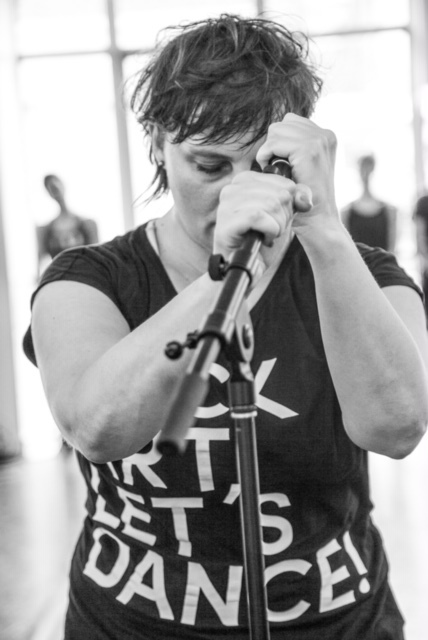
photo by Miguel Anaya
RL: My therapist was talking about the idea of contamination: the idea that we contaminate each other. Even that, that takes on a negative connotation. So we have to stay apart so we don’t contaminate each other. But, we do contaminate each other, and we should! We contaminate each other with joy, and happiness, and life, and babies– this is only one aspect of contamination and this happens to be negative, and deadly, but more often there are all of these other types of contamination that happen, that are life-giving. And vibrant. And generative. And we have chosen to get rid of all of that, that 99% of the time happens, and is good. To prevent this that has happened that is bad.
This has happened before, bubonic plague and Spanish flu, people have had to quarantine and then they have come back together. But SHOULD we come back together? We are all together over Skype right now. Do we really need to fly across the world? Or should we just Skype, because it’s cheaper and easier and I can see you. It’s weird, it’s almost like fighting for touch, fighting for skin, you know? How hard are we going to fight to touch someone? Hopefully we fight tooth and nail for that, but I don’t know. It’s a crazy time.
Dance isn’t going to die, it hasn’t and it won’t, it’s just going to transform into another thing! This dislocation of dance is dislocating dance into something else. I don’t know if the story is dramatized, but Louis XIV took ballet out from the palaces into a public theater, saved ballet because when the French revolution and all the royals were beheaded, ballet was saved by being dislocated into the theater. And now, dance was in the theaters, and now it’s going into the streets, and now it’s going onto the screens, and it’s going all these other places, and in theory, that’s exciting.
CT: What does it mean for humanity to not be together, to not travel, to not share with other people, to be afraid to touch other people, to be afraid to be with other people, afraid to be close to other people? I’m trying to figure out how to have some hope.
IT: It has been portrayed differently, in the media, in the US, and over here. Over here, it’s very matter-of-fact, they tell you very clearly look, it’s most likely 70-80% of the population will get the virus but there’s only a very small fraction that will die from it. I remember being in the states for the swine flu or the bird flu, and looking at the American news versus the German news. Then the Germans were calm, the Americans were not.
EG: But that has to do with their health systems and what they can sustain and support. Because they don’t have the health system to provide for the people.
RL: Sweden can do what they’re doing because they have the capacity to take care of people.
EG: It also has to do with the personality of the place. In Sweden and in Germany, people follow the rules, they listen. Other countries don’t know how to follow rules or refuse to, and they are more at risk because of it.
RL: Then there are all these commercials. Every company has put out a commercial. Car companies, clothing companies; everything has their COVID commercial. First of all, how did they film it? Did they have a special license to get all those people in the same room and shoot this commercial? The Gap is here for you, in COVID-19! Capitalist companies are rebranding themselves as deeply caring, about you, about your family, about your babies, about the older adults in your family. We’re here for you, because we’re Apple. It’s psychologically perverse! You’ve monetized a virus, you’ve found a way to make money, you’ve rebranded yourselves as caring but it’s really just figuring out how to make money while nobody’s shopping. Is that happening in other places or is that really an American perversion?
JL: Very much American.
EG: I don’t have TV, so I don’t know.
RL: I heard the other day and I assume it’s true, that small businesses can apply for these loans, but Chase Bank, JP Morgan Chase got $20 million for a small business loan from the government? Trump figured out a way to help out his cronies with these small business loans! I mean, it’s horrible! Shake Shack got it, Shake Shack is a big, you know, hamburger chain, but they gave it back, some companies that have gotten it have been conscientious enough to give it back, but– I mean, JP Morgan Chase got a small business loan from the government.
CT: There are small grants that artists can apply for, like DanceNYC has all these emergency grants that people can apply for– everything’s cancelled and people have to pay their rent, so people are writing like, eight grants a week.
I lost a lot of projects and a lot of tours, a lot of things. That’s hard. I don’t understand how people in America do it. Already people get second mortgages on their houses to do pieces. For things to get cancelled when people are already in the hole. I guess we all just have to hope that it’s going to come back, sometime, someway.
RL: There are so many companies that will not survive.
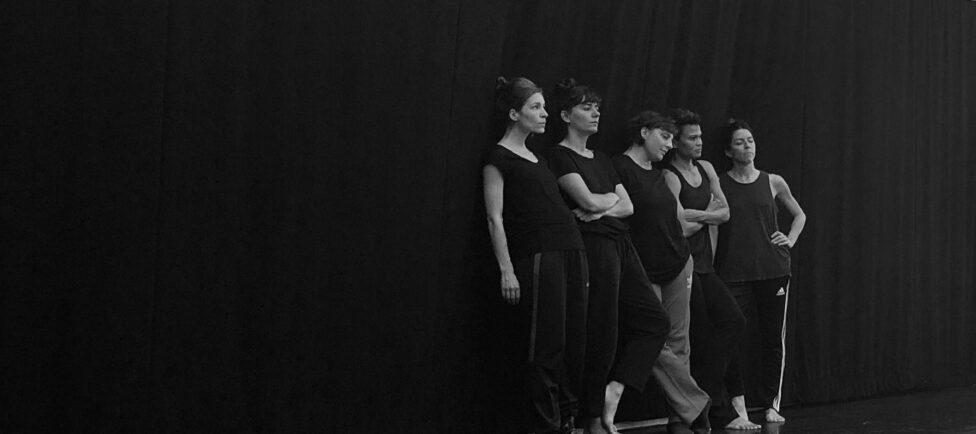
photo by Julia Discenza
JL: This year was already going to be the final year of my organization in its old form. So this was already going to be a weird year, a slow-down, a transition year. The only serious event I was planning to raise money for had been really working towards a ten-day live gathering of artists from almost all continents and is actually really prioritized the idea to gather, live, to create time and space for a meaningful encounter and share practices. Now, the option of doing it online, it doesn’t really go with the initial idea or desire. It’s like Antigone– I cannot make a funeral so the ritual is not fulfilled. Because I cannot bury my organization the way I wanted, it’s almost like an open end, and postponing is not working because it’s too big an event, too many international artists involved. So we have been discussing alternatives. Funny enough our initial aims are even more relevant in this moment and now we need to confront it and practice what we preach and prove to ourselves that our choreography has tools to help us going through this crisis. We have brainstormed and it is quite a intense process, we came up with an idea to not give up an idea of a live gathering, but understanding that we don’t know when it will be possible, we designed a three years research project online, that way we can actually pay our artists to be researching and gathering online regularly.
We wanted to prepare ourselves, we wanted to be ready for everything we wanted to do within these ten days, it would already be too much, it would be crazy, it would be definitely too much things happening, we actually spread things out over the whole next year, and then the second year that hopefully we will already know when the live gathering is going to be possible again, it’s going to be dedicated to kind of together imagining the new world, we are very much aware that the old world is never coming back. In a way, it is a situation in which we don’t know how the future will actually look like, but we actually know how it’s not going to look. Hopefully, we were trying to see it as an invitation, to look and imagine as an exercise a different world and collect the practices we found relevant for the future, and also accompanying people to go through this trauma now.
I think that this is very exciting, and I was uplifted by the reaction of all of our funders who have agreed to keep the funds and have agreed to move the funds that were originally allocated to travelling or accommodations, everything goes now to fees. We can really now help people. We can really pay. Also for me it is extremely important to give people work. I am really obsessed with inventing tasks for people to make sure that not everybody is feeling this power relationship of me helping you with one-time donation. But rather to prove that the knowledge we have is important, it’s something we need. It’s really valued. And literally, we will make you needed, and we also want to make artists really sharing the knowledge and we want to pay for it properly.
We can develop a certain community online, and we are actually not interested in gathering for long durational hours in front of the computers. So we came up with the idea of a monthly magazine. We are gonna actually produce materials such as podcasts, video recordings, lectures, different kinds of texts. We will be uploading those information every month, and we decided that we will meet every month for two hours, where we will only discuss an exercise: how we will build togetherness in these super difficult online moments. And we are hoping when there is the possibility of live gatherings, we will start to meet locally. The project is called “Grand Reunion” which has now gained an extra meaning, an extra layer, because we will actually know each other quite well, for two years of our meetings online. But it will be so different to finally be able to meet in person.
My desire is to help people go through it all, and this is a very important part of what I understand why I am doing art. It’s not preaching, it’s not telling people what it is. It’s really accompanying people and helping with the tools that we have to go through it, because the only way out is through, right? And we wanna do it together.
And, I mean, it is dark now, but dark doesn’t necessarily mean something bad. We just don’t know. Maybe we have a chance to define it. Even on a micro scale. I don’t want to work like I used to– always under-supported, always begging my artist friends to perform for half-fees. I don’t wanna do it! It’s fucking insane. I don’t wanna do it anymore. But maybe now I could focus on really helping people, and not everybody, but I will do it, and I can help.
CT: Living in New York City, I was not happy for a while with how busy I was, how busy I felt. And I blamed it on the culture, or the internet, or the ability to work all the time or all of these other things. Having this pause, having everybody having to stop, there is a gift in this. It wasn’t working. I wasn’t surviving well. I was burnt out. I don’t know how to fix it, but I know it’s not going to be the same.
RL: I want us to be able to retain the good things that have happened in the midst of this. Pollution is down, the water is clear, the animals are coming back. How can we keep that going?
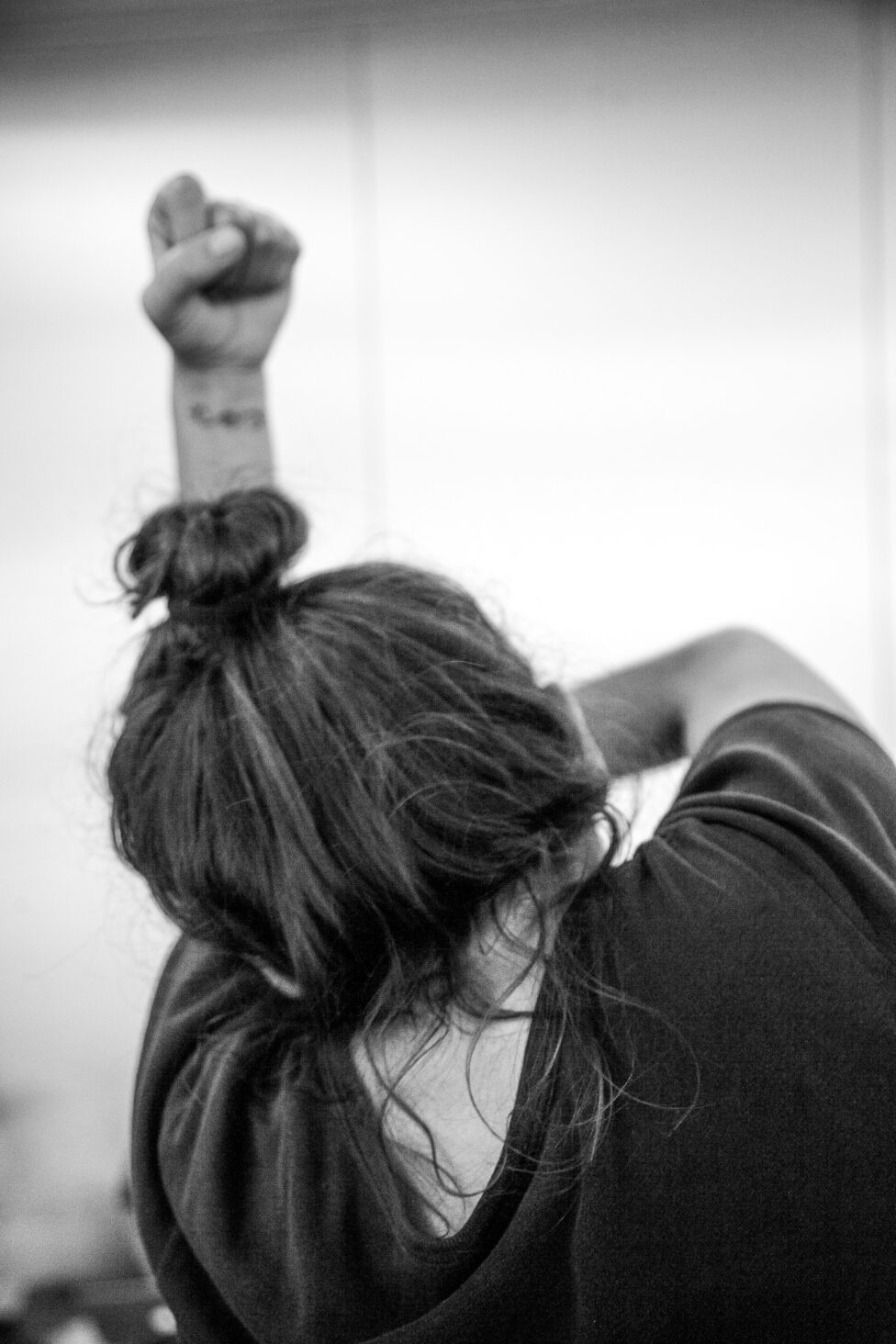
photo by Miguel Anaya
JL: We need to bring back the importance of local networks and all the people around us. Because in our field, and especially in a country like Poland, we have this obsession of always looking to the West. Inviting international groups, inviting international teachers, going somewhere because that proves that you are an important artist. But there is knowledge and importance right here. We are all knowledgeable, and we just need to share!
RL: Someone has to figure out how to take this moment and move dance to the mainstream. Not in a way where it starts to erode the artistry, but to where you hear Nancy Pelosi saying, “You can never dance too much [this is Covid care, just keep dancing].” A mainstream politician was telling the American people to keep dancing?!? How can dance become the thing that everybody wants and needs rather than something we can dispose of? I don’t know how to do that.
JL: There’s already an eruption of online content now. People are sharing their works, previews, archives, and everything is for free. Here we are again, missionaries who will save the world, where people need what we know. They need online yoga, online breathing, online trauma release exercises. We have our big hearts open and when the world comes back they will rescue the economy, not art or the artists.
RL: The title of this conversation could be “Sharing Is Caring.”
CT: My friends talk about how there’s a lot of people jogging now. They are having to dodge other joggers meanwhile there are people walking and biking all around and no one is wearing a mask.
JL: It is a new social choreography.
CT: There’s so much fear in the body now.
IT: When is the moment when you would feel safe again?
JL: …when people start to trust, when you’re gonna forget?
EG: …when you’re not going to think about it?
CT: …when you have that freedom from your mind.
This conversation occurred in April 2020, and has been edited for publication.
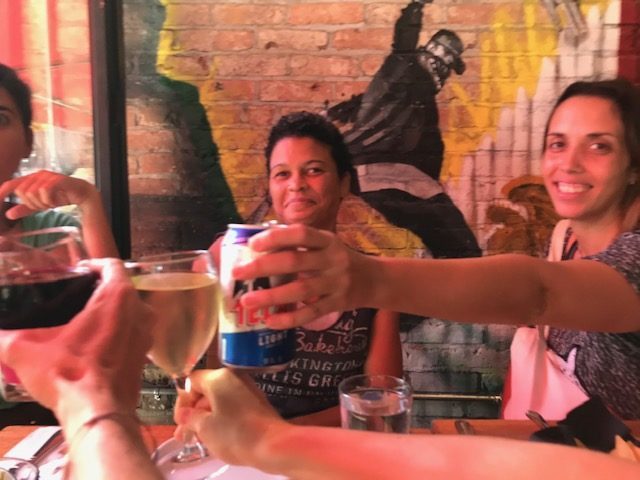
photo by Colleen Thomas

